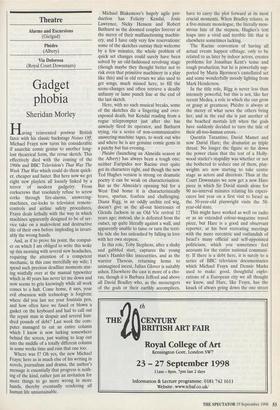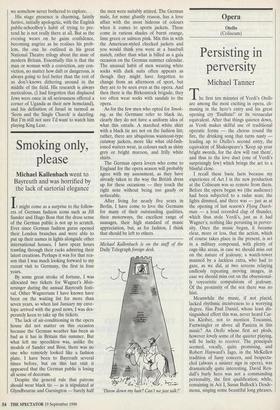Theatre
Alarms and Excursions (Gielgud) Phedre (Albery) Via Dolorosa (Royal Court Downstairs)
Gadget phobia
Sheridan Morley
Having reinvented postwar British farce with his classic backstage Noises Off, Michael Frayn now turns his considerable if anarchic comic genius to another long- lost theatrical form, the revue sketch. This effectively died with the coming of the 1960s and BBC Television's That Was The Week That Was which could do them quick- er, cheaper and faster. But here now we get eight new playlets all loosely linked by a terror of modern gadgetry. From corkscrews that resolutely refuse to screw corks through fire-alarms, answering- machines, car-locks to television remote- controls and airline safety procedures, Frayn deals lethally with the way in which machines apparently designed to be of ser- vice take on a malevolent and destructive life of their own before imploding in invari- ably the wrong hands.
And, as if to prove his point, the comput- er on which I am obliged to write this woke up this morning with several new headaches, requiring the attention of a competent mechanic, in this case mercifully my wife; I spend such precious deadline moments star- ing wistfully over at the manual typewriter which in 40 years has never let me down and now seems to grin knowingly while all work comes to a halt. Come home, it says, your evil obsession with technology is forgiven; where did you last see your fountain pen, and how often have we fused or blown a gasket on the keyboard and had to call out the repair man in despair and several hun- dred pounds of debt? Last week the com- puter managed to eat an entire column which I know is now lurking somewhere behind the screen, just waiting to leap out into the middle of a totally different column in some weeks time and ruin that one too.
Where was I? Oh yes, the new Michael Frayn; here as in much else of his writing in novels, journalism and drama, the author's message is essentially that progress is noth- ing of the kind, rather just an invitation for more things to go more wrong in more hands, thereby eventually rendering all human life unsustainable. Michael Blakemore's hugely agile pro- duction has Felicity Kendal, Josie Lawrence, Nicky Henson and Robert Bathurst as the doomed couples forever at the mercy of their malfunctioning machin- ery, and I have only very few reservations: some of the sketches outstay their welcome by a few minutes, the whole problem of quick set changes could surely have been solved by an old-fashioned revolving stage (though maybe they thought better not to risk even that primitive machinery in a play like this) and in old revues we also used to get songs, much missed here, to fill the scene-changes and often retrieve a deadly unfunny or lame punch line at the end of the last sketch.
Here, with no such musical breaks, some of the sketches die a lingering and over- exposed death, but Kendal reading from a rogue teleprompter just after she has unwisely fired its operator, and Bathurst trying, via a series of non-communicative answering-machine tapes, to work out who and where he is are genuine comic gems in a patchy but fun evening.
Phedre (launching an Almeida season at the Albery) has always been a tough one; neither Euripides nor Racine ever quite got its characters right, and though the new Ted Hughes version is strong on dramatic poetry it can be weak on characterisation. But as the Almeida's opening bid for a West End home it is characteristically brave, spartan, fearless and challenging. Diana Rigg, in an oddly urchin red wig, doesn't give us the all-out histrionics of Glenda Jackson in an Old Vic revival 12 years ago; instead, she is defeated from the outset, up quite literally against a wall, and apparently unable to tame or turn the terri- ble tide she has unleashed by falling in love with her own stepson.
In this role, Toby Stephens, after a shaky and gabbled start, captures the young man's Hamlet-like insecurities, and as the warrior Theseus, returning home to unimagined incest, Julian Glover is suitably ashen. Elsewhere the cast is more of a cho- rus, though it is Barbara Jefford and above all David Bradley who, as the messengers of the gods or their earthly accomplices, have to carry the plot forward at its most crucial moments. When Bradley relates, in a five-minute monologue, the literally mon- strous fate of the stepson, Hughes's text leaps into a vivid and terrible life that is elsewhere sometimes lacking.
The Racine convention of having all actual events happen offstage, only to be related to us later by indoor actors, creates problems for Jonathan Kent's tense and tough production, but he is powerfully sup- ported by Maria Bjornson's castellated set and some wonderfully moody lighting from Mark Henderson.
In the title role, Rigg is never less than intensely powerful, but this is not, like her recent Medea, a role in which she can grow or grasp at greatness; Phedre is always at the mercy of what news the others bring her, and in the end she is just another of the beached mortals left when the gods have suddenly decided to turn the tide of their all-too-human errors.
Quentin Tarantino, David Mamet and now David Hare; the dramatist as triple threat. No longer the figure so far down the power chain that the test of a Holly- wood starlet's stupidity was whether or not she bothered to seduce one of them, play- wrights are now starting to take centre stage as actors and directors. Thus at the Court Downstairs we now get a new Hare piece in which Sir David stands alone for 90 no-interval minutes relating his experi- ences last year on a first visit to Israel as the 50-year-old playwright visits the 50- year-old state.
This might have worked as well on radio or as an extended colour-magazine travel piece, but Hare is a good and observant reporter, at his best recreating meetings with the more eccentric and outlandish of Israel's many official and self-appointed politicians, which you sometimes feel accounts for the entire national communi- ty. If there is a debt here, it is surely to a series of BBC television documentaries which Michael Frayn and Dennis Marks used to make: good, thoughtful explo- rations of a European city we all thought we knew, and Hare, like Frayn, has the knack of always going down the one street we somehow never bothered to explore.
His stage presence is charming, faintly furtive, initially apologetic, with the English public-schoolboy's habit of trying to pre- tend he is not really there at all. But as the evening wears on he gains confidence, becoming angrier as he realises his prob- lem, the one he outlined in his great National Theatre trilogy about the state of modern Britain. Essentially this is that the man or woman with a conviction, any con- viction, no matter how daft or dangerous, is always going to feel better than the rest of us don't-knows dithering around in the middle of the field. His research is always meticulous, (I had forgotten that displaced Jews were once in all seriousness offered a corner of Uganda as their new homeland), and his definition of Israel in turmoil as `Sects and the Single Church' is dazzling. But I'm still not sure I'd want to watch him playing King Lear.











































































 Previous page
Previous page